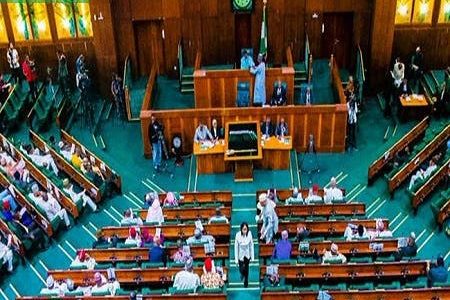
The House of Representatives on Tuesday summoned the Governor of the Central Bank of Nigeria CBN, Mr Yemi Cardoso, over lifting the ban on 43 items restricted in 2015 from accessing forex. The CBN boss is to appear before the House Committees on Baking Regulation and Customs to explain the rationale behind the policy. The resolution followed the adoption of a motion of urgent public importance moved by Hon Sada Soli (APC, Katsina) at the plenary presided over by the Speaker Hon Tajudeen Abbas While moving the motion, Hon Soli said that the bank’s policy would negatively impact local production by exposing the Nigerian market to unfair competition. He pointed out that the decision would hardly impact the Nigerian economy, and “middlemen” may take undue advantage of the new policy. While contributing to the motion, Hon Jesse Onuakalusi, a lawmaker who represents the Oshodi/Isolo II federal constituency of Lagos, proposed that the CBN should reverse the policy until legislative action on the matter. However, the amendment to the motion was rejected when it was put to voice by Tajudeen Abbas, speaker of the house Recall that in June 2015, the Central Bank announced that some 41 items were “Not Valid for Foreign Exchange” because they could easily be produced in Nigeria rather than being imported into the country. Some of the affected items include rice, cement, margarine, palm kernel, palm oil products, vegetable oils, meat and processed meat products, vegetables and processed vegetable products, poultry, tomatoes/tomato paste, soap and cosmetics, and clothes. Other items include private aeroplanes/jets, Indian incense, tinned fish in sauce, cold rolled steel sheets, galvanized steel sheets, roofing sheets, wheelbarrows, head pans, metal boxes/containers, enamelware, steel drums and pipes, wire mesh, steel nails, wood particle boards, and panels. Equally affected were security and razor wire, wood particle and fibre boards and panels, wooden doors, furniture, toothpicks, glass/glassware, kitchen utensils, tableware, tiles (vitrified, ceramics), textiles, wooden fabrics, plastic/rubber products, polypropylene granules, and cellophane wrappers. The CBN subsequently added fertiliser and maize/corn to the list of banned items. However, On 12 October 2023, the CBN announced the restoration of the 43 items to the official FX platform. President Bola Tinubu had on Monday, during an appearance at the Nigeria Economic Summit held in Abuja, explained the reason for the policy. According to him, “You’ve heard that the CBN removed about 43 items, I’ve read all the comments, but there must be a clear line between monetary policy and fiscal policy. “Are these items on trade embargo? No. You simply move them to the parallel market. Let’s compete with whatever is available so that the government will work hard and increase the economy’s investment. “
The House of Representatives on Tuesday summoned the Governor of the Central Bank of Nigeria CBN, Mr Yemi Cardoso, over lifting the ban on 43 items restricted in 2015 from accessing forex. The CBN boss is to appear before the House Committees on Baking Regulation and Customs to explain the rationale behind the policy. The resolution followed the adoption of a motion of urgent public importance moved by Hon Sada Soli (APC, Katsina) at the plenary presided over by the Speaker Hon Tajudeen Abbas While moving the motion, Hon Soli said that the bank’s policy would negatively impact local production by exposing the Nigerian market to unfair competition. He pointed out that the decision would hardly impact the Nigerian economy, and “middlemen” may take undue advantage of the new policy. While contributing to the motion, Hon Jesse Onuakalusi, a lawmaker who represents the Oshodi/Isolo II federal constituency of Lagos, proposed that the CBN should reverse the policy until legislative action on the matter. However, the amendment to the motion was rejected when it was put to voice by Tajudeen Abbas, speaker of the house Recall that in June 2015, the Central Bank announced that some 41 items were “Not Valid for Foreign Exchange” because they could easily be produced in Nigeria rather than being imported into the country. Some of the affected items include rice, cement, margarine, palm kernel, palm oil products, vegetable oils, meat and processed meat products, vegetables and processed vegetable products, poultry, tomatoes/tomato paste, soap and cosmetics, and clothes. Other items include private aeroplanes/jets, Indian incense, tinned fish in sauce, cold rolled steel sheets, galvanized steel sheets, roofing sheets, wheelbarrows, head pans, metal boxes/containers, enamelware, steel drums and pipes, wire mesh, steel nails, wood particle boards, and panels. Equally affected were security and razor wire, wood particle and fibre boards and panels, wooden doors, furniture, toothpicks, glass/glassware, kitchen utensils, tableware, tiles (vitrified, ceramics), textiles, wooden fabrics, plastic/rubber products, polypropylene granules, and cellophane wrappers. The CBN subsequently added fertiliser and maize/corn to the list of banned items. However, On 12 October 2023, the CBN announced the restoration of the 43 items to the official FX platform. President Bola Tinubu had on Monday, during an appearance at the Nigeria Economic Summit held in Abuja, explained the reason for the policy. According to him, “You’ve heard that the CBN removed about 43 items, I’ve read all the comments, but there must be a clear line between monetary policy and fiscal policy. “Are these items on trade embargo? No. You simply move them to the parallel market. Let’s compete with whatever is available so that the government will work hard and increase the economy’s investment. “

Credit: Nigeria Tribune

